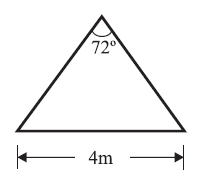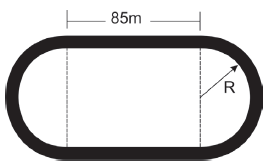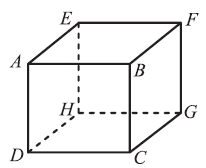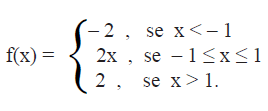Questões Militares
Para bio-rio
Foram encontradas 558 questões
Resolva questões gratuitamente!
Junte-se a mais de 4 milhões de concurseiros!

Sabendo que os dois ângulos não indicados são iguais e que tg(36º) ≅ 0,727, concluímos que o painel ocupará aproximadamente uma área de:
Considere que cada segmento reto de uma pista de atletismo tenha 85m de comprimento e que o raio interno de cada semicircunferência seja R, como ilustra a figura a seguir.

Neste caso, se a pista tem, em sua raia interna, 400m
de comprimento total, então o raio R, em metros, mede
aproximadamente:
Considere o cubo a seguir.

O segmento de reta  é paralelo ao seguinte segmento:
é paralelo ao seguinte segmento:
Avalie se cada afirmativa a seguir está certa ou errada:
I: x3
+ 2x2
= 2x5
II: (x – 2)(x + 2) = x2
– 4
III: 2x2
.x = 2x3
IV: 2xy – 2x = y
Estão corretas as afirmativas:
Considere a função real

A imagem de f(x) é:
Observe o trecho da reta numérica a seguir.

Nesse caso, a letra que indica o zero (0) é:
Texto 3
Drifting apart: Amazing underwater photos that show the growing gap between two tectonic plates

Tuesday, May 31 2011
(http://www.dailymail.co.uk/sciencetech/article-1385589/
The-growing-gap-Eurasia-North-American-
tectonic-plates.html#ixzz1NxZAFhWp)
Texto 3
Drifting apart: Amazing underwater photos that show the growing gap between two tectonic plates

Tuesday, May 31 2011
(http://www.dailymail.co.uk/sciencetech/article-1385589/
The-growing-gap-Eurasia-North-American-
tectonic-plates.html#ixzz1NxZAFhWp)
Texto 2
Brazil to replace oil rigs with ‘underwater cities’
Traditional oil rigs will be replaced with “underwater
cities” within a decade under ambitious plans being drawn
up by Petrobras, Brazil’s state-owned energy group.

A Petrobras oil platform at Guabanara bay in Rio de Janeiro.
Petrobras plans to turn science fiction into reality to
extract oil from the vast pre-salt oil fields discovered off
the south east coast of Brazil.
The plan is to construct ‘cities’ more than 2,000 metres
under water, containing machines, giant pieces of
equipment and robots that could inspect the systems
being used to extract millions of barrels of oil. Many
operations would be fully automated while others would
be controlled by humans at a distance.
Petrobras already owns virtual reality laboratories where
engineers can inspect 3D images of oil fields. But now
they want to take a further technological leap by installing
floating rig equipment on the sea bed.
The machinery under the sea would be capable of
separating oil, gas, water and sand, compressing
substances and generating enough energy to keep the
operation functioning.
energy/oilandgas/8228548/Brazil-to-replace-
oil-rigs-with-underwater-cities.html)
Texto 2
Brazil to replace oil rigs with ‘underwater cities’
Traditional oil rigs will be replaced with “underwater
cities” within a decade under ambitious plans being drawn
up by Petrobras, Brazil’s state-owned energy group.

A Petrobras oil platform at Guabanara bay in Rio de Janeiro.
Petrobras plans to turn science fiction into reality to
extract oil from the vast pre-salt oil fields discovered off
the south east coast of Brazil.
The plan is to construct ‘cities’ more than 2,000 metres
under water, containing machines, giant pieces of
equipment and robots that could inspect the systems
being used to extract millions of barrels of oil. Many
operations would be fully automated while others would
be controlled by humans at a distance.
Petrobras already owns virtual reality laboratories where
engineers can inspect 3D images of oil fields. But now
they want to take a further technological leap by installing
floating rig equipment on the sea bed.
The machinery under the sea would be capable of
separating oil, gas, water and sand, compressing
substances and generating enough energy to keep the
operation functioning.
energy/oilandgas/8228548/Brazil-to-replace-
oil-rigs-with-underwater-cities.html)
Texto 2
Brazil to replace oil rigs with ‘underwater cities’
Traditional oil rigs will be replaced with “underwater
cities” within a decade under ambitious plans being drawn
up by Petrobras, Brazil’s state-owned energy group.

A Petrobras oil platform at Guabanara bay in Rio de Janeiro.
Petrobras plans to turn science fiction into reality to
extract oil from the vast pre-salt oil fields discovered off
the south east coast of Brazil.
The plan is to construct ‘cities’ more than 2,000 metres
under water, containing machines, giant pieces of
equipment and robots that could inspect the systems
being used to extract millions of barrels of oil. Many
operations would be fully automated while others would
be controlled by humans at a distance.
Petrobras already owns virtual reality laboratories where
engineers can inspect 3D images of oil fields. But now
they want to take a further technological leap by installing
floating rig equipment on the sea bed.
The machinery under the sea would be capable of
separating oil, gas, water and sand, compressing
substances and generating enough energy to keep the
operation functioning.
energy/oilandgas/8228548/Brazil-to-replace-
oil-rigs-with-underwater-cities.html)
Texto 2
Brazil to replace oil rigs with ‘underwater cities’
Traditional oil rigs will be replaced with “underwater
cities” within a decade under ambitious plans being drawn
up by Petrobras, Brazil’s state-owned energy group.

A Petrobras oil platform at Guabanara bay in Rio de Janeiro.
Petrobras plans to turn science fiction into reality to
extract oil from the vast pre-salt oil fields discovered off
the south east coast of Brazil.
The plan is to construct ‘cities’ more than 2,000 metres
under water, containing machines, giant pieces of
equipment and robots that could inspect the systems
being used to extract millions of barrels of oil. Many
operations would be fully automated while others would
be controlled by humans at a distance.
Petrobras already owns virtual reality laboratories where
engineers can inspect 3D images of oil fields. But now
they want to take a further technological leap by installing
floating rig equipment on the sea bed.
The machinery under the sea would be capable of
separating oil, gas, water and sand, compressing
substances and generating enough energy to keep the
operation functioning.
energy/oilandgas/8228548/Brazil-to-replace-
oil-rigs-with-underwater-cities.html)
Texto 2
Brazil to replace oil rigs with ‘underwater cities’
Traditional oil rigs will be replaced with “underwater
cities” within a decade under ambitious plans being drawn
up by Petrobras, Brazil’s state-owned energy group.

A Petrobras oil platform at Guabanara bay in Rio de Janeiro.
Petrobras plans to turn science fiction into reality to
extract oil from the vast pre-salt oil fields discovered off
the south east coast of Brazil.
The plan is to construct ‘cities’ more than 2,000 metres
under water, containing machines, giant pieces of
equipment and robots that could inspect the systems
being used to extract millions of barrels of oil. Many
operations would be fully automated while others would
be controlled by humans at a distance.
Petrobras already owns virtual reality laboratories where
engineers can inspect 3D images of oil fields. But now
they want to take a further technological leap by installing
floating rig equipment on the sea bed.
The machinery under the sea would be capable of
separating oil, gas, water and sand, compressing
substances and generating enough energy to keep the
operation functioning.
energy/oilandgas/8228548/Brazil-to-replace-
oil-rigs-with-underwater-cities.html)